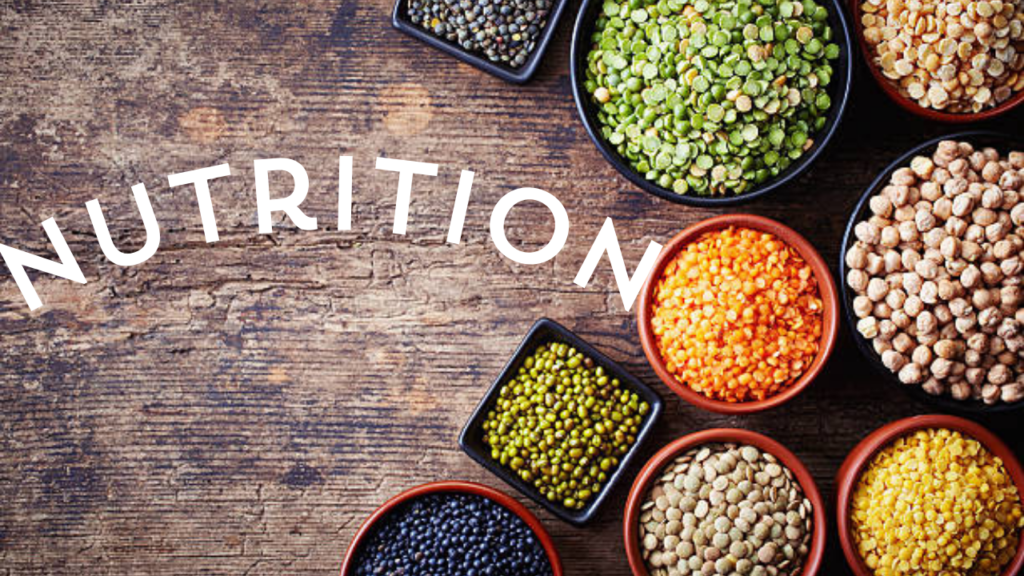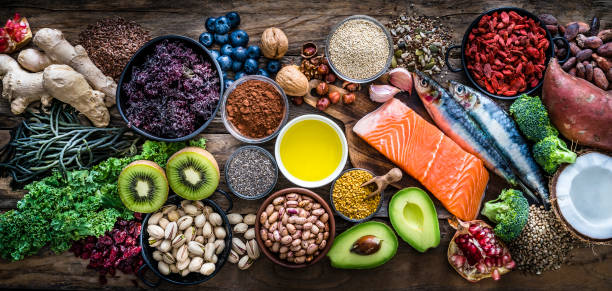Nutrition is the foundation of good health, playing a crucial role in everything from energy levels to disease prevention. Understanding what nutrition is and how to optimize your diet can lead to a longer, healthier life. This comprehensive guide will cover the basics of nutrition, the importance of a balanced diet, healthy food choices, the role of daily vitamins, and specific nutritional considerations for older adults. Additionally, we’ll provide practical meal prep ideas to help you stay on track with your nutritional goals.

What is Nutrition and Why is Nutrition Important?
What is Nutrition?
Nutrition is the process by which our bodies take in and utilize food to support life. It involves the ingestion, digestion, absorption, and metabolism of nutrients, which are substances in food that our bodies need to function correctly. These nutrients include macronutrients (carbohydrates, proteins, and fats) that provide energy, and micronutrients (vitamins and minerals) that are vital for various bodily functions.
Why is Nutrition Important?
Proper nutrition is essential for several reasons:
- Energy and Vitality: Nutrition provides the fuel needed for daily activities, physical fitness, and mental alertness. Carbohydrates, fats, and proteins are the primary sources of this energy.
- Growth and Development: Nutrients are essential for the growth and development of tissues, bones, and muscles. This is particularly important during childhood, adolescence, and pregnancy.
- Disease Prevention: A balanced diet helps prevent chronic diseases such as heart disease, diabetes, and obesity. Foods rich in antioxidants, fiber, and essential nutrients play a significant role in protecting against these conditions.
- Mental Health: Certain nutrients, including omega-3 fatty acids, B vitamins, and magnesium, support brain health and may help reduce the risk of mental health disorders such as depression and anxiety.
- Immune Function: Good nutrition strengthens the immune system, helping the body resist infections and recover more quickly from illnesses.
What Foods Are Healthy?
Whole Foods
A healthy diet should be based on whole foods, which are minimally processed and rich in nutrients. Whole foods include:
- Fruits and Vegetables: These are packed with vitamins, minerals, fiber, and antioxidants. Leafy greens like spinach and kale, and fruits such as berries and citrus, are particularly beneficial for health.
- Whole Grains: Foods like brown rice, quinoa, oats, and whole wheat bread are excellent sources of fiber and essential nutrients like B vitamins and iron.
- Lean Proteins: Protein is crucial for building and repairing tissues. Healthy sources include chicken, turkey, fish, beans, lentils, and tofu. Fatty fish like salmon provide omega-3 fatty acids, which are good for heart health.
- Healthy Fats: Unsaturated fats, found in avocados, nuts, seeds, and olive oil, are beneficial for heart health and help reduce inflammation. These fats are also important for brain function.
- Dairy and Alternatives: Dairy products like milk, yogurt, and cheese provide calcium and vitamin D for bone health. For those who prefer non-dairy options, fortified plant-based milks like almond or soy milk are good alternatives.
Avoid Processed Foods
While whole foods are beneficial, it’s important to limit processed foods, which are often high in unhealthy fats, sugars, and sodium. These can contribute to weight gain, heart disease, and other health issues.
Should You Take Daily Vitamins?
The Role of Daily Vitamins
While a balanced diet should provide all the nutrients your body needs, there are situations where daily vitamins might be necessary:
- Nutrient Deficiencies: Some people may have dietary restrictions or health conditions that make it difficult to get enough nutrients from food alone. For example, vegetarians and vegans might need to supplement vitamin B12, while individuals with limited sun exposure might require vitamin D.
- Increased Nutrient Needs: Certain life stages or conditions, such as pregnancy, breastfeeding, or aging, can increase the body’s need for specific nutrients. For example, pregnant women need more folic acid and iron.
- Dietary Gaps: If your diet lacks variety or is low in certain food groups, a daily multivitamin might help fill in the gaps. However, it’s important to use supplements as a complement to, not a replacement for, a healthy diet.
Consulting with a Healthcare Provider
Before taking any vitamin supplements, it’s essential to consult with a healthcare provider. They can help determine whether you need supplementation and advise on the correct dosage. Over consumption of certain vitamins, particularly fat-soluble ones like A, D, E, and K, can lead to toxicity and adverse health effects.
Nutrition for Older Adults
Changing Nutritional Needs with Age
As we age, our bodies undergo changes that affect nutritional needs. Older adults may need fewer calories but more of certain nutrients due to changes in metabolism, muscle mass, and bone density.
- Calcium and Vitamin D: These nutrients are vital for maintaining bone health and preventing osteoporosis. Older adults should ensure they get enough through diet and, if necessary, supplements.
- Protein: Adequate protein intake is essential for preserving muscle mass and strength, which are important for maintaining mobility and independence.
- Fiber: Fiber is important for digestive health and can help prevent constipation. Whole grains, fruits, vegetables, and legumes are good sources of dietary fiber.
- Hydration: Older adults may have a reduced sense of thirst, making it important to drink plenty of water throughout the day to avoid dehydration.
- Reduced Sodium Intake: High sodium intake can contribute to high blood pressure and cardiovascular disease. It’s important for older adults to limit their consumption of salty foods and focus on fresh, whole foods.
Meal Prep Ideas
The Benefits of Meal Prep
Meal prepping is a practical approach to maintaining a healthy diet. It involves planning and preparing meals in advance, which can save time, reduce stress, and help you avoid unhealthy food choices.
- Batch Cooking: Prepare large quantities of staple foods like grains (quinoa, brown rice), proteins (chicken, tofu), and roasted vegetables. These can be used in various dishes throughout the week.
- Overnight Oats: A convenient and nutritious breakfast option, overnight oats are made by soaking oats in milk or a dairy alternative overnight. Add fruits, nuts, and seeds for added flavor and nutrients.
- Mason Jar Salads: Perfect for on-the-go lunches, these salads are made by layering ingredients in a jar, starting with the dressing at the bottom and ending with leafy greens on top. When you’re ready to eat, just shake the jar and enjoy.
- Freezer-Friendly Meals: Prepare and freeze meals like soups, stews, and casseroles for easy, homemade dinners. This is especially useful for busy weeknights when time is limited.
- Portion Control: Using portion-controlled containers can help ensure you’re eating the right amount of food and getting a balanced intake of nutrients. This is especially helpful for those managing their weight or calorie intake.
Meal Prep Tips
- Plan Your Meals: Create a weekly meal plan and shopping list to ensure you have all the ingredients you need. This will help you stay on track with your nutritional goals.
- Stay Organized: Use clear containers and labels to keep track of what you’ve prepped. This will also make it easier to grab and go during busy mornings.
- Add Variety: To avoid getting bored with your meals, switch up your recipes and try new ingredients. This will also help ensure you’re getting a wide range of nutrients in your diet.
Conclusion
Nutrition is a critical aspect of maintaining a healthy and vibrant life. By understanding the basics of nutrition, choosing healthy foods, considering daily vitamins when necessary, and planning your meals, you can optimize your diet for better health and well-being. For older adults, adapting nutrition to meet changing needs is essential for staying healthy and active. By taking a proactive approach to your diet, you can enjoy the benefits of good nutrition at any stage of life.
For more information and tips on living a healthy lifestyle, check out our other articles on HerbeeLife.



